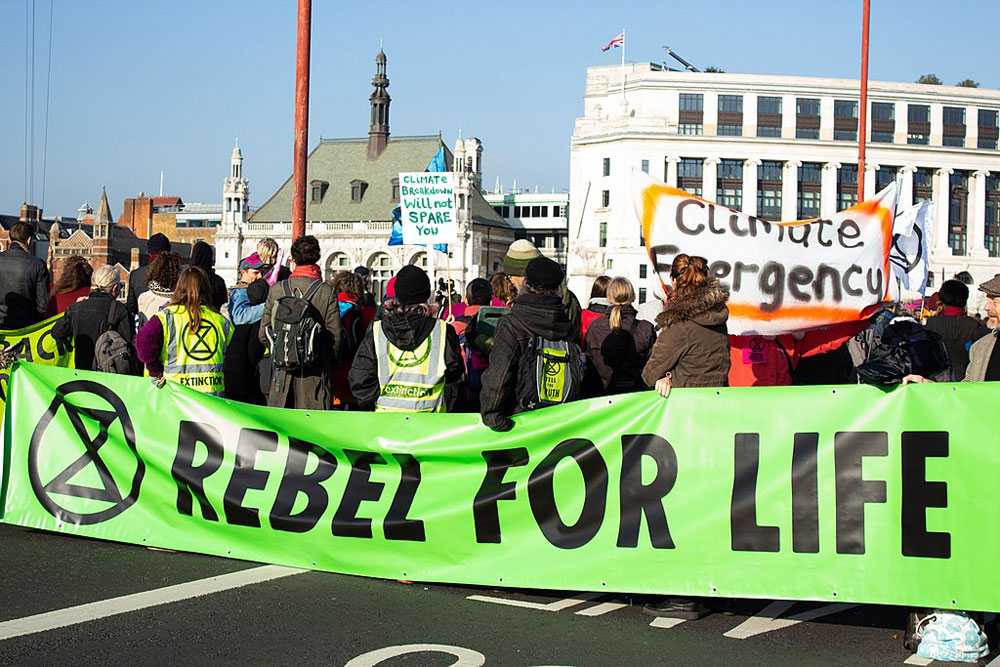
October 8, 2019; Vox
Global climate change. Poverty and economic inequity. Racism and bigotry. Violence. Each would make a list of social and political issues that affect the lives of millions. It’s been difficult, if not impossible, to gather the political will to bring about positive and rapid change. The slow, halting progress we have seen so far has come from the efforts of nonprofit organizations supported by philanthropists. Is this modest record of achievement just a reflection of how hard large problems are to solve, or does it indicate a flaw in the theory of change being brought to bear?
In August, NPQ wrote about a new philanthropic effort, the Climate Emergency Fund, which held the conviction that if we are taking the impending climate disaster seriously, a radically different kind of philanthropic investment is needed. Rather than invest resources in slow, incremental change, they wished to fund efforts to mobilize mass support for radical change. In comments to the Guardian, CEF founder Trevor Neilson explained, “We do not have time for gradualism. History shows us that change comes from the people. It is grassroots movements throughout history that force governments to act when government is resistant.”
The CEF has raised more than $1 million and made 26 grants totaling more than $800,000. Their focus is on organizations, and rather provide strategic and tactical guidance, they seek to provide the resources needed to build organizational strength.
As Rory Kennedy, another CEF founder, explains in a recent Vox interview, the funded groups “didn’t have the infrastructure to get out there in a huge way. If we can help support that, and give them some way to create that infrastructure, they can create a spark that then starts a flame that has its own energy and takes off. The more people get out in the streets, the more people get out on the streets. That’s our hope.”
CEF’s approach is illustrated by their support of British-based Extinction Rebellion, whose program is organizing rather than policy and program:
Sign up for our free newsletters
Subscribe to NPQ's newsletters to have our top stories delivered directly to your inbox.
By signing up, you agree to our privacy policy and terms of use, and to receive messages from NPQ and our partners.
Extinction Rebellion is an international movement that uses non-violent civil disobedience in an attempt to halt mass extinction and minimize the risk of social collapse…Government must tell the truth by declaring a climate and ecological emergency, working with other institutions to communicate the urgency for change.
With the help of significant funding from CEF and the Children’s Investment Fund Foundation, Extinction Rebellion has organized street demonstrations in London and allied with Greta Thunberg’s recent efforts to support the worldwide climate strike.
Differing from many philanthropists, CEF’s focus for funding is on building political pressure so policymakers will be willing to make hard decisions about difficult changes. They have no agenda for what those actions need to be; they have faith that the expertise is there to create workable public and private actions when the will to act is in place. This allows them to minimize the grant structure they impose on those they support and allows them to risk money on small and unproven organizations. As Neilson described it to Vox, “The Fund aims to be lean and disruptive, to embrace the emergency mindset of the movement…we are not killing people with reporting; we have not sat down six Harvard MBAs and designed a dashboard.”
When you’re giving a grant for $1,000, there’s just a certain amount of trust involved. We ask grantees to provide reporting to us on what they do. The agreement is quite important, because it creates the legal framework for our relationship. We insist on our funding not being used for any illegal activities of any kind. But the only reporting we’ve asked for is a very basic [end-of-project report].”
When NPQ first looked at their nascent efforts, we wondered if CEF was the start of a new wave of aggressive philanthropy. From their perspective, they are setting the stage so that others can follow. According to Kennedy, “We’re creating an infrastructure for [philanthropists] to come in, where it’s safe, it’s legal, we’re vetting these organizations out on the street… we’re hopeful that people are going to get on board in a big way.”
If CEF is right, then its brand of philanthropy should spread to other intractable issues. If larger partners are ready to join, there’s a chance to break through the logjams that have locked out social progress. They will also be leading the way to significant confrontations, as philanthropists with less progressive orientations learn from them. This leaves us wondering whether CEF looks good if you agree with their perspective, but will end up pushing the nonprofit and philanthropic sectors into the same divisive reality that has split our political situation. Would that be a good thing?—Martin Levine










